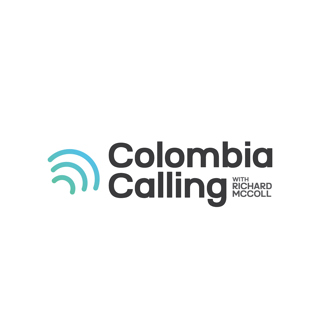
588: Where is Matavén? Community Tourism in Colombia's distant Orinoco Region
Where is Matavén, you may well ask? So, this week on the Colombia Calling podcast, we discuss an award-winning community tourism project with people of the Piaroa indigenous community and the Colombian Project. Joining us on the podcast is Camilo Ortega, product manager of the Colombian Project. The Matavén Jungle is the fourth largest Indigenous Reservation in Colombia, with an extension of 1,849,613 hectares and located in the north-eastern area of the department of Vichada, between the Vichada rivers to the north, Orinoco to the east, Guaviare to the south and the Chupave canal to the west. Today it constitutes one of the last refuges of the transition forest between the Colombian Amazon and Orinoquía region. This territory has a great diversity of landscapes and different habitats such as floodplains, large stone hills of the Guyanese shield, or open savannah areas in the middle of its jungles. Its name is due to the Matavén river, which crosses this extensive region in a west-east direction. Approximately 10,500 indigenous people live in the Matavén Jungle, distributed among the Sikuani, Piapoco, Piaroa, Pinave, Curripaco, and Cubeo tribes. This characteristic of multiculturalism that exists in the reservation makes this region a space of great importance for the conservation of the existing natural and cultural heritage. https://www.colombianproject.com And this week, the Colombia Briefing is reported by Sophie Foggin. Support us: www.patreon.com/colombiacalling
14 Okt 1h

587: The Final Stretch: Hiking the Andes from Argentina to Venezuela
In this second part of our conversation with Oliver Treviso, we explore his experiences in the final two countries of Colombia and Venezuela. By all accounts, Colombia and Venezuela were believed to be the most risky countries to hike the Andes in, but what did Oliver experience? And so, Richard McColl of the Colombia Calling podcast continues his conversation with Ollie Treviso, who shares his incredible journey hiking through South America. They discuss Oliver's experiences in Ecuador, the challenges he faced while crossing into Colombia, and the kindness he encountered along the way. Oliver reflects on the dangers he encountered, including a mugging, and the resilience he found in the people he met. The conversation also touches on his experiences in Venezuela, where he was welcomed warmly and even invited to speak at universities. As Oliver contemplates his future adventures, he emphasizes the importance of storytelling and the lessons learned from his journey. The Colombia Briefing is reported by Emily Hart: https://substack.com/@ehart
7 Okt 57min

586: 7 countries, 8000 miles, 21 months and 9 pairs of shoes: How Oliver Treviso hiked the Andes
I came into this conversation thinking that I'd be chatting about the trivialities of an expedition through South America and I left in a state of absolute disbelief and awe. Oliver Treviso is a fascinating and incredible individual who has become the first person ever to hike the length of the Andes through Argentina, Chile, Bolivia, Peru, Ecuador, Colombia and Venezuela. In this first episode, we discuss how this adventure came to be...his experience sailing in a catamaran across the Atlantic from the Canary Islands to Brazil, and by all accounts the boat was hardly seaworthy. Then, a love for South America was kindled and before long, he was back on the continent and hiked for 21 months, for 8000 miles and wearing out nine pairs of shoes. The journey was not without its hazards and dangers, but he made it. We'll record a second episode with Oliver to hear more about his time in Colombia and Venezuela, but for the time being, tune in to an amazing story of human kindness and spirit. Oliver is raising money for, Mind Ystradgynlais, a mental health charity and you can donate here: https://minditv.org.uk/walking-the-andes/ The Colombia Briefing is reported by Emily Hart: https://harte.substack.com Support us: https://patreon.com/colombiacalling
30 Sep 1h 7min

858: 'A truth which cried out loud' - the families still seeking justice for the 'false positives' murders
This week, Colombia’s special peace tribunal, the JEP, handed down its first sentences to the soldiers who murdered and framed civilians to boost military statistics – killings which came to be known as the ‘false positives.’ The court has ordered those who committed atrocities to work on community projects, to build works in the territories where they left scars, and to face the communities whose rights they violated, as agreed in the 2016 Peace Accord. I’ll be explaining the ruling in this week’s Colombia Briefing along with this week’s other headlines. To mark this historic ruling, this week’s episode will be an extended and updated audio version of Emily Hart's investigation into those war crimes and the families still seeking justice – an article first published in DG Magazine - read by the author herself. During Colombia’s civil conflict, the army murdered thousands of civilians - framing them as guerrillas and criminals to boost statistics. In exchange for ‘combat kills,’ soldiers received cash, holidays, and promotions. The official number is 6,402 – though many estimate that the real number is closer to 10,000.
23 Sep 55min

584: Authentic Cartagena
Cartagena is the eternal city of Colombian tourism. The Old City, the UNESCO World Heritage ramparts and colonial streets are protected from the ills befalling contemporary Colombia and so, this picturesque and sophisticated destination, with direct international flights from Europe and the United States, is frequently adorning the covers of glossy travel magazines. However, there is more to Cartagena, beyond the chic rooftop bars, the colonial architecture and the incredible restaurants. Travel is different now visitors demand authenticity and experiential options. And, this is where Nina Schlieper of Alternate Travel Cartagena and Bruce McLean of BNB Colombia Tours come in. Working with the local communities and within the area of La Boquilla - a small fishing village outside of Cartagena - Nina's agency works to empower women, teach the heritage and history of the region and generate income and employment in this part of the Caribbean coast. Tune in to this excellent and upbeat episode of the Colombia Calling podcast. https://www.alternativetravelcartagena.com/home/ https://bnbcolombia.com The Colombia Briefing is reported by Emily Hart. https://harte.substack.com
16 Sep 57min

583: The Hidden History of Alvaro Uribe, part 2
Following fast in the footsteps of Episode 1: "Alvaro Uribe the Early Years and Rise to Power, 1952-1994," Adriaan Alsema of Colombia Reports and myself have now completed Episode 2 for you of this series entitled: "The Hidden History of Alvaro Uribe," part 2. All Colombia-watchers are well aware of the polarising nature of the former two-time president and so Alsema and I have been putting together this series, citing documentation that is all in the public domain as so many of the actual facts are lost in the incessant noise surrounding Uribe. As events have been moving fast surrounding Uribe and his sentencing last month, Alsema and myself also put out an "explainer episode" which can also be accessed here on Patreon. The Colombia Briefing is reported by Emily Hart. Please subscribe to her Substack: https://harte.substack.com
9 Sep 1h 55min

582: Neo-Liberalism in Downward Dog - Gentrification, Inequality, and Crime in Colombia's Cities
In this episode of the Colombia Calling podcast, Richard McColl and Emily Hart engage with Professor Nicolas Forsans of the University of Essex, a Latin America specialist, to discuss the multifaceted issues facing Latin American cities, including violence, inequality, urbanization, and gentrification. Together, they explore the historical context of these challenges, the role of grassroots communities, and the pervasive issue of extortion. The conversation also delves into the dynamics of organized crime, the impact of gentrification, and potential solutions to these pressing problems, emphasizing the need for economic growth and stronger state institutions. Check out Nicolas Forsans' substack: https://sinfiltroya.substack.com/ and The Colombia Briefing with Emily Hart: https://harte.substack.com
2 Sep 1h 26min

581: Cultivating Justice? How cannabis regulation might transform Colombia
This week, Emily Hart speaks to Lucas Marin Llanes - the director of development at the Latin American Drug Studies Network, and a research affiliate at the Andes University’s Center for Security and Drugs Studies (CESED). There are already some allowances for personal and medicinal use, but last month, Lucas and CESED proposed a whole new framework for legalised commercialisation. The first question is of course, why do it? Lucas proposes that regulation (done right) might be a way to take power from Colombia’s armed groups, and to ensure decent working conditions for rural farmers; it could also ensure the quality and content of the cannabis people are consuming – as well as contributing to a realistic public health policy on the issue. But is it too soon for Colombia – are the security guarantees in place to avoid retaliation against those who want to join legal markets? Is the market built to ensure social justice outcomes - and inclusion for those who have long been a part of the chain of production? And - crucially - is there the political consensus to drive the policy through? And, somewhat paradoxically, is it too late? Has President Gustavo Petro’s government – despite radical work at international bodies – fumbled the project, leaving no time in the remaining year of his mandate to make real change in the country? So how might it be done? And what are the stakes? We’ll be getting into all of it in today's episode. And since Emily Hart is hosting the podcast again – the Colombia Briefing will be subscriber only this week – if you want to make sure you never miss an update, you can head to harte.substack.com and sign up to get the news as text and audio every Monday.
26 Aug 1h 8min





















